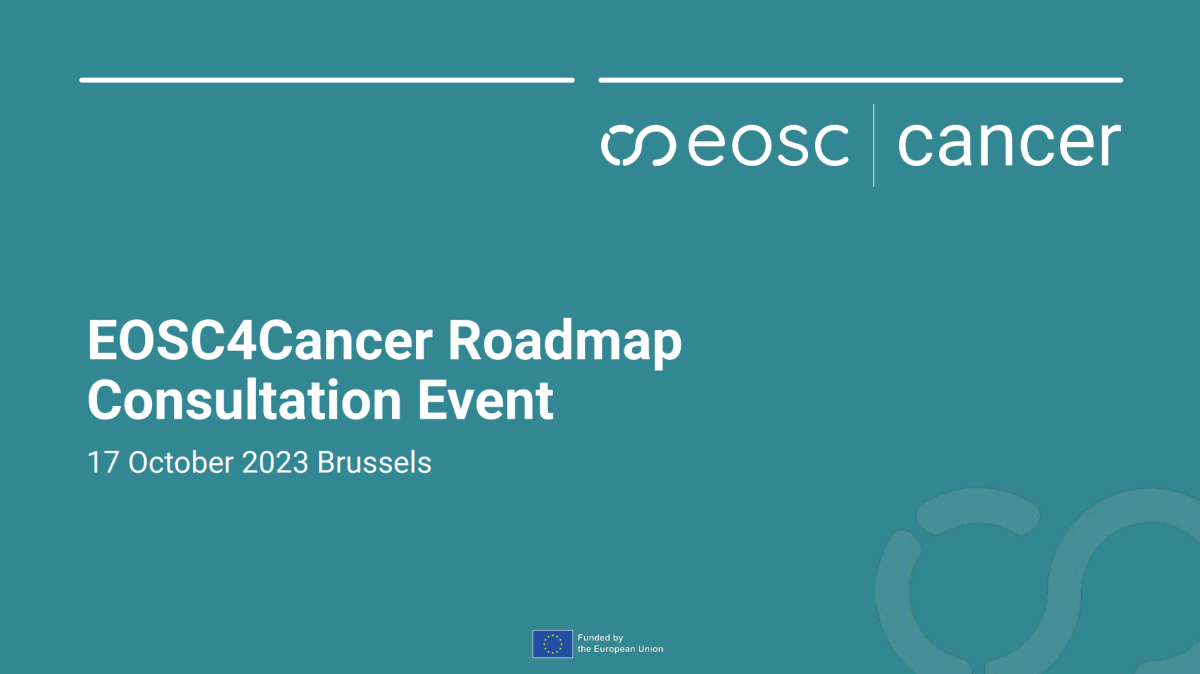Defining the Roadmap for a European Cancer Data Space
SciLake representatives participated to the EOSC4Cancer consultation to define a Roadmap for a European Cancer Data Space. This article recaps the key points from the workshop.

EOSC4Cancer, the European-wide foundation to accelerate data-driven cancer research, recently held a face-to-face workshop in Brussels to define a Roadmap for a European Cancer Data Space. SciLake representatives participated in a discussion with around 30 stakeholders from various sectors including research, industry, patient care, survivor groups, and EOSC. The discussion focused on key aspects for a sustainable cancer dataspace, such as access models, governance, data quality, security, and privacy.
The insights collected will be used in the creation of a roadmap, scheduled for publication in early 2025. This roadmap aims to shape the future of the European cancer dataspace, with policy recommendations to the European Commission.
EOSC4Cancer Objectives
EOSC4Cancer is a Europe-wide initiative that aims to accelerate data-driven cancer research. Launched in September 2022, this 30-month project will provide an infrastructure to exploit cancer data. It brings together comprehensive cancer centers, research infrastructures, leading research groups, and major computational infrastructures from across Europe.
The expected outcomes include a platform designed for storing, sharing, accessing, analyzing, and processing cancer research data. This involves interconnecting and ensuring interoperability of relevant datasets, as well as providing scientists with easy access to cancer research data and analysis systems. Additionally, the initiative will contribute to the Horizon Europe EOSC Partnership and other partnerships relevant to cancer research.
A Federated Digital Infrastructure for accelerating Cancer Research
The EOSC4Cancer Roadmap envisions a federated digital infrastructure to accelerate cancer research in the EU. It will rely on existing European and national structures and serve as the digital data infrastructure for the future Virtual European Cancer Research Institute, a platform enabling storage, sharing, access, analysis, and processing of research data. The structure will align with major European efforts for enabling the use and re-use of cancer-related data for research and will accommodate varying levels of maturity across member states. The federated infrastructure will include centralized components and capabilities, remote software execution, and a Cancer Research Commons repository. Each EU Member State is expected to have a National Data Hub for Cancer-related data and other relevant structures, such as national nodes and reference hospitals.
The plan is to develop in stages, first focusing on National Data Hubs, then involving Competence Centers and other participants. The National Data Hubs will reflect the structure of the Digital Hub. They will host a national database for cancer research data, allow the use of Research Environments, provide computing power, and coordinate outreach efforts.
Roundtable Discussions
The workshop held roundtable discussions on four topics: missing data types, missing data sources, requirements for national nodes, and any other element missing from the roadmap.
The first topic focused on identifying missing data types, such as synthetic data, specified clinical data, reference data, specified clinical data, social data, patient-generated data, and epidemiology of survivors. The discussion also emphasized the importance of preparing data for future use, connecting different types of data across various platforms, and ensuring that data comes from reliable sources by implementing quality checks and guidelines for data submission.
The second topic revolved around the data sources, discussing what is missing in the long list of data sources, how trusted they are, and how they can be connected and prioritized. The key sources identified include structural biology data, patient-generated data, demographic data, complete clinical trial datasets, and biobanks.
The third topic concerned the requirements for national nodes. The discussion recognized that these nodes should be flexible and adaptable to the needs of different countries. It was agreed that coordinating existing initiatives, while not necessarily simple, is preferable to creating something new.
In conclusion, additional elements for the roadmap were identified. These relate to the patient journey, the treatment and product development journey, and non-tangible aspects such as data governance, clinical data usage, and cybersecurity. The roadmap should also consider incentives for scientists, communication strategies, and a plan for the platform's sustainability.
Conclusion
The workshop was a significant step towards defining the Roadmap for a European Cancer Data Space. The insightful discussions and collaborative efforts of the participants identified the requirements for comprehensive cancer data, trusted data sources, and functional national nodes.
Through these collaborative efforts, the EOSC4Cancer initiative is paving the way for a more data-driven and interconnected future in cancer research across Europe.